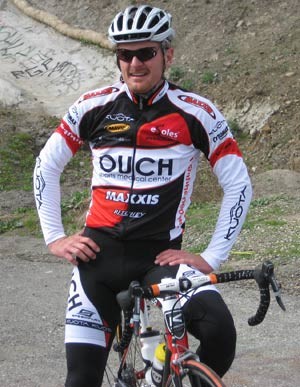Talks at New Pathways for Pro Cycling conference about the need to keep things in perspective
 Floyd Landis has spoken frankly about his experiences after testing positive during the 2006 Tour de France, saying that he effectively painted himself into a corner and waited far too long to admit to having doped in his career. “It took me longer than it probably should have,” he said at the New Pathways for Pro Cycling conference in Geelong earlier today.
Floyd Landis has spoken frankly about his experiences after testing positive during the 2006 Tour de France, saying that he effectively painted himself into a corner and waited far too long to admit to having doped in his career. “It took me longer than it probably should have,” he said at the New Pathways for Pro Cycling conference in Geelong earlier today.
“As much as it hurts to sit and tell my mom I lied, and to tell other people that I lied, it’s better than the alternative.”
He said that one of the reasons why he ultimately confessed was for his own wellbeing, saying that he didn’t want to end up like Marco Pantani and others who felt trapped.
Once he made his mind up to admit what he had done, Landis expected to face criticism. “I knew that having defended myself in the beginning, and having lied about never having doped, that no matter when I changed the story…no matter when I I decided to tell the details of what I’d done, the argument was always going to be the same. It was going to be that I shouldn’t be believed now,” Landis told those present, according to AP.
He said that the prime intention for him speaking about everything which went on wasn’t to be a catalyst for change, but rather for his own conscience. However, if it helped to move the sport forward, he was happy to be part of it. “Until I can sit here, and a lot of other people can sit down and talk about how it came to be that way, it’s going to be hard to find a solution,” he stated. “There are good people in cycling who also made the same decisions I made.”
Landis was invited to Australia in order to appear at the two day anti-doping conference. The news that he would travel there was initially greeted with a media frenzy, but once he made it clear that he was not going to speak about the federal investigation currently being conducted into the US Postal Service team, Lance Armstrong and others, the furore died down.
Landis has remained true to his word, declining reporters’ requests to talk about that investigation. Instead, he has concentrated on his own experience of going from hero to zero, of being a rider who helped Lance Armstrong win some of his Tours, who took the 2006 edition of the race, and who was subsequently disqualified after testing positive for testosterone. He denied doping for over three years, but finally confessed this spring, detailing the doping practices of both himself and others.
“I really didn’t want to put anyone else through it,” he insisted, talking about the ordeal, but then added he felt a full and frank disclosure was necessary. “It was an unpleasant experience to say the least. And even to this day I wish there was a way to tell the truth without getting anyone else involved.”
Landis took questions from the audience and was asked if he was willing to be an example to young riders, to tell them about his experiences in a bid to show them how to avoid falling into the same pattern of behaviour. He said that he felt that others were more qualified to act as examples, and that he would be uneasy in such a role.
“It is difficult for me to try to say I would accept that position, as there are professional cyclists who raced their careers and didn’t dope,” he said, adding that it was hard to tell who was really clean. “Most people don’t really want to tell the truth if they did. I don’t know. [But] I don’t really believe I am in a position to be that person, to set an example.
“I would just like people to know what my experience was, and the fact that if I could do things differently again, I would like to. I would like to go race my bicycle and enjoy it for what I enjoyed it for in the first place.”
Elaborating on that point, Landis said that the important thing was to keep a sense of perspective, not to get swept away in the drive to reach the very top. “The only advice I can really give to kids who are interested in being professional cyclists is to try to remember why it is that they enjoy it. Because…I believe that any professional sport becomes something other than what it starts out being when you are a kid. It always becomes more complex and there’s politics and other things that come with it.
“But if you can somehow focus on remembering why it was you enjoyed it in the first place, in light of those decisions that you have to make along the way, I think it is easier to not get caught up in making poor decisions.”